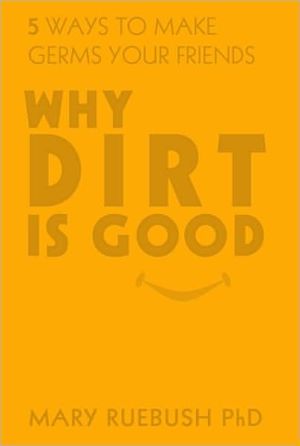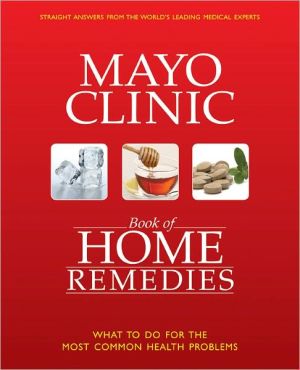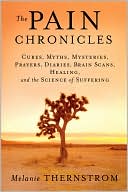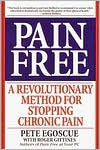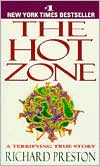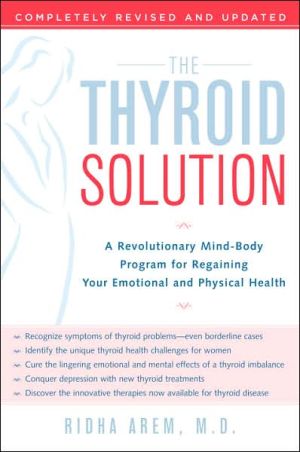Why Dirt Is Good: 5 Ways to Make Germs Your Friends
""The archetypal link between dirt and guilt, and cleanliness and innocence is built into our language,"" says journalist Katherine Ashenburg. But Dr. Mary Ruebush counters that with the fact that Western civilization's obsession with antibacterial soaps and our quest to be clean all the time is actually making us sick.\ Why Dirt is Good is a fun look at the plus side of dirt and germs. Complete with cartoons, the book features irreverant yet medically sound advice that illustrates how we can...
Search in google:
""The archetypal link between dirt and guilt, and cleanliness and innocence is built into our language,"" says journalist Katherine Ashenburg. But Dr. Mary Ruebush counters that with the fact that Western civilization's obsession with antibacterial soaps and our quest to be clean all the time is actually making us sick. Why Dirt is Good is a fun look at the plus side of dirt and germs. Complete with cartoons, the book features irreverant yet medically sound advice that illustrates how we can become healthier by exposing ourselves to a bit of dirt and germs. Divided into four parts, the book will explore through text and cartoons: Part 1 Dirt = good, antibiotics = badPart 2 How your immune system really works How the immune system develops in childrenPart 3 What a germ or bug is trying to do to prolong its life in the presence of antibacterials and antibioticsPart 4 What you can do to make your immune system healthier Publishers Weekly In her first book, microbiology and immunology teacher Ruebush demonstrates a lively mastery of her subject, providing a better education in immunology than a convincing case for the idea that "the most delightful sights for a parent should be a young child covered in dirt from an active afternoon of outdoor play." Her thesis, reiterated throughout, is that obsessive cleanliness is counterproductive: a "young, naïve immune system" needs exposure to germs "to build the ability to produce the right response quickly." Arguing that evolution has conditioned us to coexist with the microscopic threats around us-a human body typically harbors "some 90 trillion microbes"-Ruebush considers the legacy of "superbugs" bred through the overuse of antibiotics and cleaning products, and dismisses vaccination fears as ridiculous ("not even a question"). Ruebush presents a step-by-step guide to the workings of the immune system that should inform readers new to the subject, but her breezy and repetitive approach to arguing her thesis probably won't win over any doubters. Copyright © Reed Business Information, a division of Reed Elsevier Inc. All rights reserved.
Introduction viiPart 1 How Your Immune System Works 1Meet Your Immune System 3You versus Germs 19Part 2 The 5 Cardinal Rules for a Strong Immune System 39Rule 1 Let Them Eat Dirt: Boot Camp for Young Cells 41Rule 2 Use It or Lose It: Exercise Your Immune System 67Rule 3 Don't Encourage Superbugs: Avoid Antimicrobics Whenever Possible 103Rule 4 Immunity the Easy Way: Keep Your Vaccinations Up to Date 135Rule 5 Always Ask First, What Would Mother Nature Do? Common Sense as a Cure 157Glossary 175About the Author 197
\ Publishers WeeklyIn her first book, microbiology and immunology teacher Ruebush demonstrates a lively mastery of her subject, providing a better education in immunology than a convincing case for the idea that "the most delightful sights for a parent should be a young child covered in dirt from an active afternoon of outdoor play." Her thesis, reiterated throughout, is that obsessive cleanliness is counterproductive: a "young, naïve immune system" needs exposure to germs "to build the ability to produce the right response quickly." Arguing that evolution has conditioned us to coexist with the microscopic threats around us-a human body typically harbors "some 90 trillion microbes"-Ruebush considers the legacy of "superbugs" bred through the overuse of antibiotics and cleaning products, and dismisses vaccination fears as ridiculous ("not even a question"). Ruebush presents a step-by-step guide to the workings of the immune system that should inform readers new to the subject, but her breezy and repetitive approach to arguing her thesis probably won't win over any doubters. \ Copyright © Reed Business Information, a division of Reed Elsevier Inc. All rights reserved.\ \
